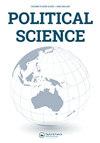Politics of Indonesia
IF 1.2
4区 社会学
Q3 POLITICAL SCIENCE
引用次数: 32
Abstract
Indonesia is often referred to as the world’s largest Muslim democracy. This characterization testifies to the country’s large population (at approximately 270 million, it is the world’s fourth most populous) and to the vast majority (approximately 87 percent) professing the Islamic faith. But Indonesia is also a country of immense ethno-linguistic heterogeneity, even among its dominant Muslim demographic. While this complex social fabric is reflected in the state motto of “Unity in Diversity,” it also has contributed to contentious processes of nation-building over decades wherein different forms of collective violence have figured prominently. Dutch traders arrived in the archipelago in the 16th century, but not until the mid-19th century did a colonial administration gain coherence on the main island of Java. This bureaucracy made uneven headway in the more sparsely populated outer islands. Colonialization spurred an inclusive anticolonial nationalist movement, despite the existence and persistence of deep factions along religious, ethnic, and ideological lines. The movement’s leaders proclaimed independence following Japan’s surrender in World War II, although it took a bloody revolutionary war, coupled with intense negotiations, for the country’s sovereignty to be formally recognized in 1949. Less than two decades of shaky parliamentary democracy followed, but democracy was replaced by authoritarianism, first gradually by President Sukarno (or Soekarno), and then more violently by General Suharto (or Soeharto), who gained power via an anti-Communist massacre in 1965 and 1966. The Cold War strongman also dedicated his New Order regime to developing the country economically, despite his government’s legendary corruption. Before the authoritarian Suharto was forced to resign following three decades in power in 1998, amid the Asian Financial Crisis, the World Bank had classified Indonesia as a lower-middle-income country. Today, Indonesia is a procedural democracy with a mixed presidential and parliamentary system, although the president has tended to outmuscle the legislature. Indonesiaand regularly holds competitive national and local elections, leading the country to be hailed as a successful case of a stable Muslim democracy. But mounting and destabilizing Islamism has led scholars of late to reexamine how consolidated Indonesia’s democracy actually is. State institutions are weak, for example, and corrupt political parties have enabled worrisome polarization. Debates on improving the country’s democratic deficits, such as alleviating poverty more swiftly and institutionalizing the rule of law, consume scholars and observers alike, as do discussions on protecting public civility and minority rights (even for key sectors of Muslims) amid rising religious nationalism.印尼政治
印尼经常被称为世界上最大的穆斯林民主国家。这一特点证明了该国人口众多(约2.7亿,是世界第四人口大国),绝大多数人(约87%)信奉伊斯兰信仰。但印度尼西亚也是一个种族语言差异巨大的国家,即使在其占主导地位的穆斯林人口中也是如此。尽管这种复杂的社会结构反映在“多样性中的团结”的国家格言中,但它也促成了几十年来有争议的国家建设进程,在这些进程中,不同形式的集体暴力占据了突出地位。荷兰商人于16世纪抵达该群岛,但直到19世纪中期,殖民政府才在主岛爪哇岛上取得一致。这种官僚主义在人口更稀少的外岛取得了不均衡的进展。殖民地化引发了一场包容性的反殖民民族主义运动,尽管宗教、种族和意识形态上存在着根深蒂固的派系。日本在第二次世界大战中投降后,该运动的领导人宣布独立,尽管经过一场血腥的革命战争,加上激烈的谈判,该国的主权才在1949年得到正式承认。随后不到20年的议会民主摇摇欲坠,但民主被威权主义所取代,首先是由苏加诺总统(或苏加诺)逐渐取代,然后是由苏哈托将军(或苏哈托)更为暴力地取代,苏哈托在1965年和1966年通过反共大屠杀获得权力。这位冷战时期的强人还将他的新秩序政权奉献给了国家的经济发展,尽管他的政府有着传奇般的腐败。1998年,在亚洲金融危机期间,独裁的苏哈托在执政30年后被迫辞职之前,世界银行曾将印度尼西亚列为中低收入国家。如今,印度尼西亚是一个程序民主国家,总统制和议会制相结合,尽管总统的力量往往超过立法机构。印尼定期举行竞争激烈的全国和地方选举,使该国被誉为稳定的穆斯林民主的成功案例。但是,伊斯兰主义愈演愈烈,破坏稳定,最近学者们重新审视印尼民主的巩固程度。例如,国家机构薄弱,腐败的政党导致了令人担忧的两极分化。关于改善国家民主赤字(如更快地减轻贫困和法治制度化)的辩论,以及在宗教民族主义日益高涨的情况下保护公共文明和少数群体权利(甚至是穆斯林的关键阶层)的讨论,都让学者和观察者们备受煎熬。
本文章由计算机程序翻译,如有差异,请以英文原文为准。
求助全文
约1分钟内获得全文
求助全文
来源期刊

Political Science
POLITICAL SCIENCE-
CiteScore
0.90
自引率
0.00%
发文量
13
期刊介绍:
Political Science publishes high quality original scholarly works in the broad field of political science. Submission of articles with a regional focus on New Zealand and the Asia-Pacific is particularly encouraged, but content is not limited to this focus. Contributions are invited from across the political science discipline, including from the fields of international relations, comparative politics, political theory and public administration. Proposals for collections of articles on a common theme or debate to be published as special issues are welcome, as well as individual submissions.
 求助内容:
求助内容: 应助结果提醒方式:
应助结果提醒方式:


